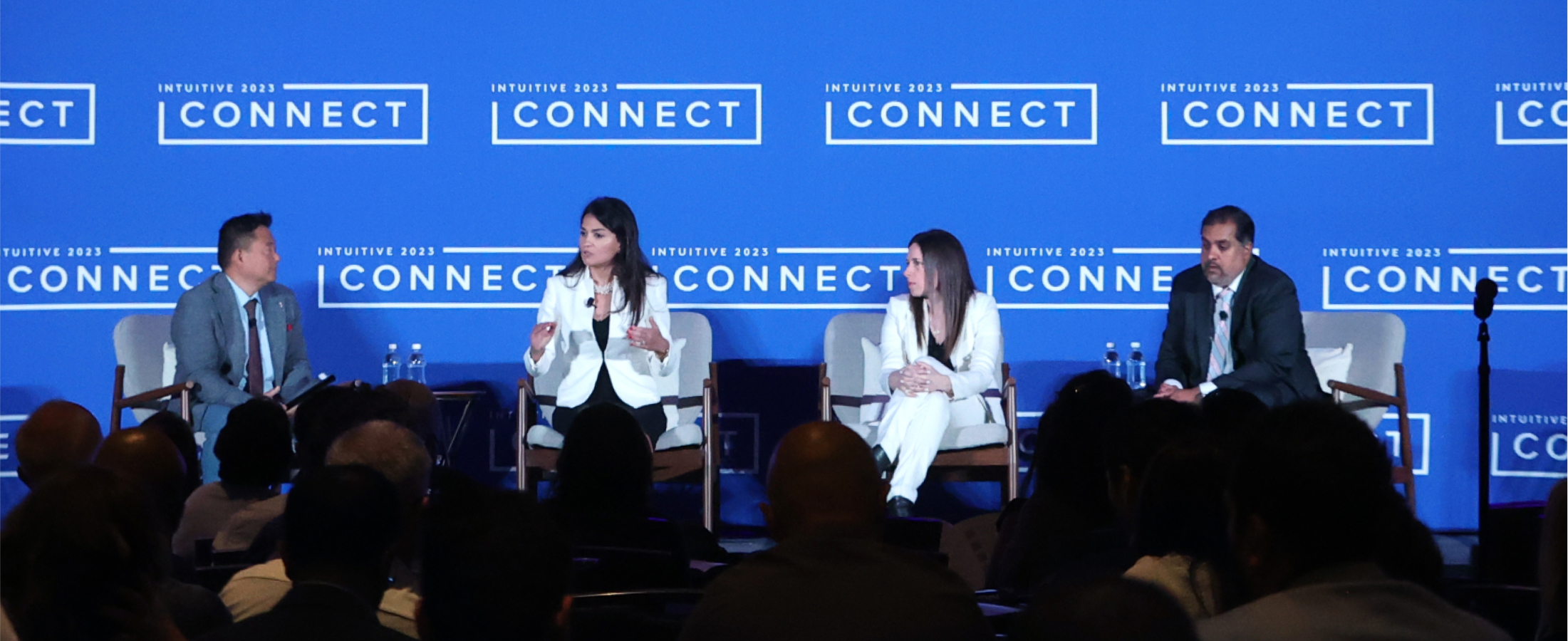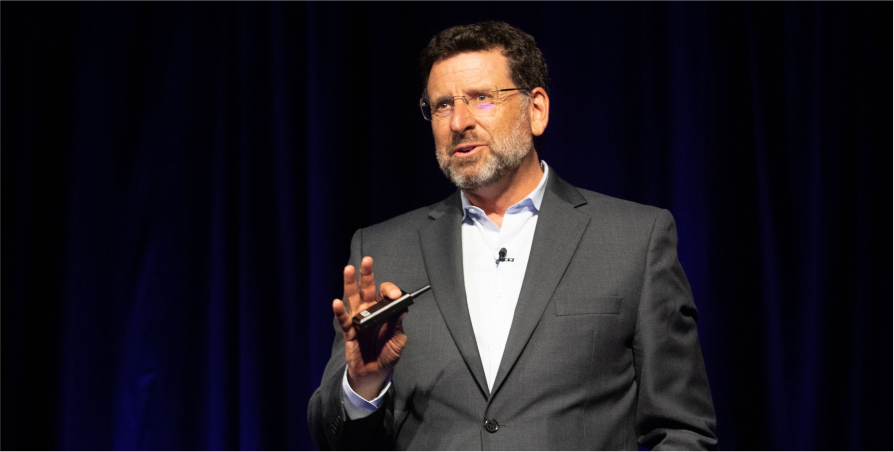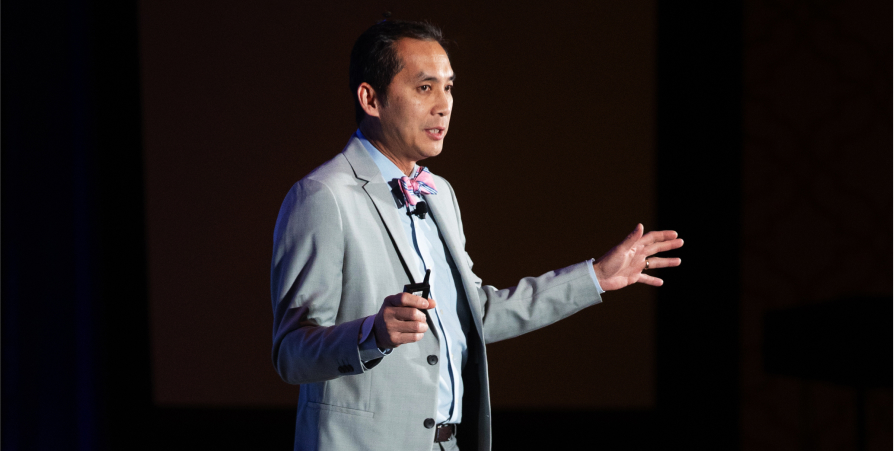

For surgeons seeking to advance their robotic surgery skills and program’s impact, Intuitive’s 2023 Connect Forums offered education and inspiration, connection and community. Together, the April event in Nashville, TN, and August event in Las Vegas, NV, saw more than 2,000 surgeons, care team members, and hospital leaders gather for discussions on the state of da Vinci surgery. Topics ranged from clinical techniques to da Vinci program optimization, hands-on experiences with systems and instruments to discussions on how data is driving insights and learning.
The Connect Forum, now in its sixth year, has become the largest annual gathering for surgeons who rely on the Intuitive da Vinci surgical system to provide patients with minimally invasive procedures as a means to better care. Many attendees are inspired by seeing cases performed by surgeons at the absolute top of their game. Many others benefit from interactions with surgeons like themselves, who are either developing new skills or da Vinci programs. Said one attendee early in his surgical career, “It’s gratifying to know that robotic surgery with da Vinci is the present and the future of acute care.”
The Connect Forum started humbly as a way to meet the needs of general surgeons looking for society-like educational opportunities to expand their use of the da Vinci system. Society events and symposia offer general surgeons a great way to connect. What was lacking was an event, with courses, conversations, and community focused specifically on using the da Vinci system to care for patients with hernias, or those needing cholecystectomies, appendectomies, colorectal, bariatric, or foregut surgery.
As with many of the earliest pioneering surgeons who embraced robotic surgery in the early 2000s for urologic and gynecological surgeries, the early adopter general surgeons faced considerable doubt and pushback on the efficacy of da Vinci. What these surgeons needed was community, a way to regularly connect, and a forum to share their learning and outcomes.
The first Connect in 2017 had roughly 200 general surgeons in attendance. Fast forward to 2023, there were two separate programs—with one focused on general surgery and another on urology and gynecology. In 2023, the events attracted 10 times the number of attendees as the first year including surgeons from every type of care environment—large academic centers and small community hospitals to ambulatory care centers.
And beginning in 2022, to address the increasingly critical role of long-term value, the forums now include an Executive Surgeon Leader track for surgeon leaders who attend with members of their administration.
In a keynote address to those participating in the Executive Surgeon Leader track, Gary Guthart, Intuitive’s chief executive officer said, “We are always looking for ways to guide the company towards something that's really going to create value for you. Not value because we say it, but value because it's real.” That’s why the company explicitly adopted the quadruple aim roughly six years ago. Success metrics started to be weighed against the goals of better patient and care team experiences and improved clinical and operational efficiencies.
“We measure through all available data sources—data off our systems, data we’ve partnered with you on, data we’ve purchased,” Guthart continued. “We’re looking to validate with data that we’re helping you deliver better outcomes relative to other treatment modalities, patient experiences that are as humane as possible, and a total cost of care for the patient event that is truly lower than alternatives.”

In a talk on Training the Future of Surgery, Dr. Arnold Advincula, a pioneer in gynecological surgery with da Vinci at New York Presbyterian, and Dr. Daniel Eun, professor, Urology Chief, Temple University Hospital, discussed the need to adapt to the learning curve of residents. New technologies including surgical video review with Intuitive Hub, simulation to master technical skills, and My Intuitive to track progress, are essential to building proficiency, and ultimately to helping reduce surgical variation.
“There are things in life that are ‘nice to have’ and ‘must have,’” said Dr. Advincula. “A da Vinci surgery program is a ‘must have’ in an academic training setting.”
Both spring and summer Connect Forums featured live da Vinci surgeries shared via Intuitive telepresence with clinicians highlighting approaches, instrument use, and learnings. In the summer event, urology surgeons, including Dr. Mutahar Ahmed from Hackensack Meridian Health, discussed the use of Intuitive da Vinci SP, a single-port, single-incision da Vinci system he uses to perform da Vinci prostate, kidney, and other surgeries. During a urology discussion at the summer session, Dr. Ahmed described the arc of his experience with da Vinci SP. Admittedly, he was hesitant at first. A new system that requires more and different training? Why? But the investment had already been made. The sense was, ‘It’s here so I may as well learn what I can.’
His initial approach was to treat the da Vinci SP system the same as da Vinci Xi. He detailed his attempt to replicate his technique. And then, a shift. He became proficient performing extraperitoneal prostatectomies. He realized the power of the system—the unique capabilities becoming available to him. Later, Dr. Ahmed spoke to scale. He shared the number of patients he was able to care for, the alternate approach he was able to take (including for simple prostatectomies), and the strategies he was able to implement. His willingness to step out of his comfort zone paid off—for him personally, for his patients, and for the care team.

If one thread tied the two 2023 forums together, it was the focus on delivering levels of care today that might have seemed impossible not long ago. Biological, computer and data sciences, robotics, artificial intelligence, and machine learning are fueling rapid transformations in how many diseases are diagnosed and treated—and how patients experience care before, during, and after hospitalization.
In his spring keynote, Jason Hart, vice president U.S. Marketing for Intuitive, challenged the audience, “I want you to think about the most incredible patient outcomes that you've had in your career, those defining moments that are vivid in your memory when you thought this changes everything. I bet a few years prior, if I would have asked you if you’d be able to deliver that level of care, those outcomes, that impact, you would have thought it was impossible.”
To drive his point home, Hart shared a story about Dr. Tracy Arnell of Columbia University. Dr. Arnell, the head of the acute care service line, was not satisfied with the high conversion rate in her program. It meant many acute care cases that began with minimally invasive laparoscopy had to be converted during the procedure to more invasive, open surgeries. This could mean larger incisions, longer recoveries, and a higher incidence of hospital readmissions. She imagined better; a new kind of program that provided access to minimally invasive robotic surgery with da Vinci. And, unlike many surgery programs where access to da Vinci is only available during a single care team shift, she wanted access 24/7. Columbia acquired a da Vinci Xi system for the acute care service line and placed it in a dedicated room. In Dr. Arnell’s first 90 days running the program, she performed more than 80 da Vinci procedures, 60 of which were acute cases. These are emergent cases, not pre-scheduled, that often arrive outside ‘normal operating hours.’ She had zero conversions to open surgeries.
According to Hart, stories like this are becoming more common as teams embrace the potential of delivering minimally invasive procedures to patients regardless of care environment or time of admission.
In 2024, the Connect Forum will merge to a once-a-year, all-specialty event. Updates and invites will be sent in the first quarter of the year. In the meantime, you can experience more of 2023 Connect, with video replays of select presentations here.
Look for more stories on leadership, problem solving, and impact at the point of possibility™.
Financial disclosure
The independent healthcare professional quoted on this website has received compensation from Intuitive for consulting and/or educational services. The material presented represents the views, experiences, and opinions of independent surgeons based on their practice and personal experience performing surgery with the da Vinci surgical system. Their experience may or may not be reproducible and is not generalizable.
Important safety information
Serious complications may occur in any surgery, including surgery with a da Vinci system, up to and including death. Examples of serious or life-threatening complications, which may require prolonged and/or unexpected hospitalization and/or reoperation, include but are not limited to, one or more of the following: injury to tissues/organs, bleeding, infection, and internal scarring that can cause long-lasting dysfunction/pain.
Risks specific to minimally invasive surgery, including surgery with a da Vinci system, include but are not limited to, one or more of the following: temporary pain/nerve injury associated with positioning; a longer operative time, the need to convert to an open approach, or the need for additional or larger incision sites. Converting the procedure could result in a longer operative time, a longer time under anesthesia, and could lead to increased complications. Contraindications applicable to the use of conventional endoscopic instruments also apply to the use of all da Vinci instruments.
For important safety information, including surgical risks and considerations, please also refer to www.intuitive.com/safety. For a product’s intended use and/or indications for use, risks, full cautions and warnings, please refer to the associated user manual(s).
Individual outcomes may depend on a number of factors, including but not limited to patient characteristics, disease characteristics, and/or surgeon experience.